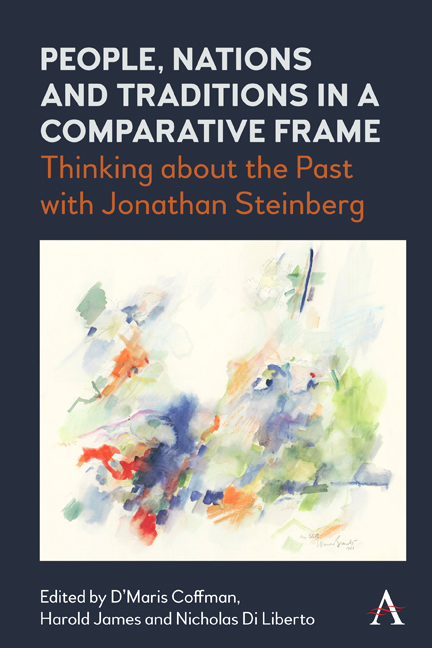 People, Nations and Traditions in a Comparative Frame
People, Nations and Traditions in a Comparative Frame Book contents
- Frontmatter
- Contents
- Foreword
- Acknowledgements
- Notes on Contributors
- Introduction
- Part One Methodological Pluralism and New Applications
- Part Two Personal and National Character
- Part Three Society, Families and the Sovereign Self
- Part Four History Out of Sync: Modernity and Tradition
- Part Five History, Narrative and the Human Condition
- Afterword
- Bibliography of Jonathan Steinberg’s Works
- Index
Chapter Seventeen - Bleak House Syndrome
Published online by Cambridge University Press: 23 February 2022
- Frontmatter
- Contents
- Foreword
- Acknowledgements
- Notes on Contributors
- Introduction
- Part One Methodological Pluralism and New Applications
- Part Two Personal and National Character
- Part Three Society, Families and the Sovereign Self
- Part Four History Out of Sync: Modernity and Tradition
- Part Five History, Narrative and the Human Condition
- Afterword
- Bibliography of Jonathan Steinberg’s Works
- Index
Summary
Dear Jonathan, I don't know how to write a piece for a Festschrift, but because you have been such an important person in my life, I am determined to try. I thought I would write about ‘Bleak House Syndrome’, the uneasy relationship between judges and litigants since, rather surprisingly, I ended up being a judge.
I turned my back on history after a lacklustre performance at Part I. I was heavily involved in ‘changing the world’ (my very small part of it) through feminist drama and working with homeless people, and I didn't understand the importance of history. Whilst I liked history as literature, I just wanted to be told the story – by a good yarn-teller like you. Why should I go through the motions of doing original research when you so obviously knew the answer to any question far more thoroughly and wisely than I did – anyway what was the point of the truth as long as the story was good? Of course, none of this was your fault; it was just that I was in such a hurry to live life that I listened badly.
So it occurred to me that if I acquired the tools of a lawyer, I could really change things; at that time, only about 7.5 per cent of solicitors were women, so the decision was made, and I was off, leaving history behind, though thankfully not our friendship, which was very magnanimous of you.
At first, it was all fighting for the underdog: crime, domestic violence, homelessness; it was my job to be one-sided. Then I got a job as an employment judge and, on a visit to you and Marion in Philadelphia, when sitting in on one on your classes, was stunned to realize how similar the process of doing good history is to doing good justice. Both are about assessing the evidence, deciding the facts and reaching reliable conclusions on a balance of probabilities, conscious always of the subjective filters in place. Suddenly, there was a point to rigorous enquiry and careful reflection; though by your standards, I do nothing more than skim the surface.
- Type
- Chapter
- Information
- People, Nations and Traditions in a Comparative FrameThinking about the Past with Jonathan Steinberg, pp. 259 - 262Publisher: Anthem PressPrint publication year: 2021
